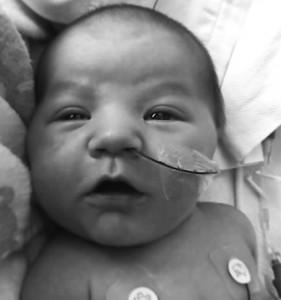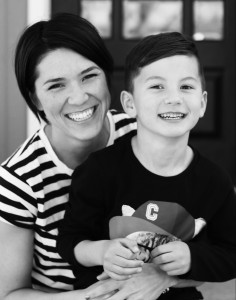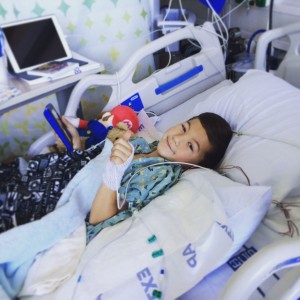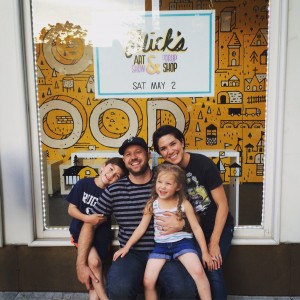 When Mick Hullinger was born, the atmosphere in the birthing room was not what Leah Hullinger, a first time mother, had envisioned. Although all the ultrasounds had come back normal, as soon as Hullinger’s baby was placed on her chest, she realized something was wrong. Mick was born with bladder exstrophy, in which the bladder doesn’t grow correctly and sticks outside the abdomen, a rare disorder that happens in about 1 in 30,000 babies.
When Mick Hullinger was born, the atmosphere in the birthing room was not what Leah Hullinger, a first time mother, had envisioned. Although all the ultrasounds had come back normal, as soon as Hullinger’s baby was placed on her chest, she realized something was wrong. Mick was born with bladder exstrophy, in which the bladder doesn’t grow correctly and sticks outside the abdomen, a rare disorder that happens in about 1 in 30,000 babies.
Mick was whisked away by ambulance to a specialty hospital in Salt Lake City, where the family lived.
“It was a whirlwind,” said Hullinger. “I checked out of the hospital only 12 hours after giving birth. I needed to be by his side. I never pictured this would happen; it’s not what you imagine when you’re having a baby.”
Adjusting to normal
Mick’s condition made the first few weeks especially complex. He underwent surgery, in which doctors placed the bladder back into his pelvic cavity and fused his pubic bones together. Because of the surgery, his legs had to be bound and he couldn’t wear clothes or diapers without having them altered.
“It was very messy, but we kept looking at the positives,” said Hullinger. “His condition wasn’t life-threatening and he was full-term. It did hit me though; it was a lot harder than I thought it was going to be.”
The surgery was successful, and eventually the family hit their stride and adjusted to their new life. They wouldn’t have to worry about next steps until Mick got older. For now, Mick could continue to wear diapers. When he was old enough, the next step would be to transition from diapers to a catheter.
Finding care away from home

The Hullinger family moved to Seattle, Wash., a couple of years later. They found Seattle Children’s, a center of excellence in treating children with bladder exstrophy.
The family met with Dr. Richard Grady, a pediatric urologist at Seattle Children’s, who teaches a method to repair bladder exstrophy to doctors around the world and also chairs the medical advisory council of the Association for the Bladder Exstrophy, a support network for patients and families worldwide.
Grady recommended the family wait for Mick to decide he was ready for the next step. The transition from diapers to a catheter would be a change, one Grady wanted to make sure Mick was ready for.
The Hullinger family moved back to Utah and waited for Mick’s decision. In February 2015, 7-year-old Mick decided it was time.
“Out of the blue, he started crying,” said Hullinger. “He said, ‘Why am I the only one with bladder exstrophy?’ He wasn’t aware there were other kids with his condition. He just felt really lonely about it. That’s when he decided. He said he wanted to be brave, and that he wanted the surgery.”
Continuing care at Seattle Children’s
Mick and his family returned to Seattle for treatment in April 2015. They met with Dr. Paul Merguerian, division chief of urology at Seattle Children’s, who Grady had recommended.
“We were so relieved when we met Dr. Merguerian,” said Hullinger. “He was such a great doctor and so personable. I really, really liked him and put trust in him. I couldn’t imagine going any where else.”
Mick’s surgery was a success. The family stayed at Seattle Children’s for 12 days while Mick recovered.
Learning to catheter and starting anew

Mick will no longer need to wear diapers. He will learn how to catheter with the help of the urology team at Seattle Children’s.
“Continence is more a quality of life issue,” said Merguerian. “It doesn’t necessarily affect your health. We wait until the child is ready to become continent, and it can take some time. Mick should be able to live a normal life. Kids with bladder exstrophy can grow up to be whatever they want. They can be athletes or doctors. They are really bright kids.”
Although Mick, doesn’t yet know what he wants to be when he grow up, he does know he wants to help other kids with bladder exstrophy.
Sharing stories and building a community
On Aug. 1, 2015, Mick and his mother will join other families with children with bladder exstrophy at an International Exstrophy Conference at Seattle Children’s. Hullinger was asked to speak at the conference about their journey through treatment and a fundraiser the family started for a little girl named Allimena.
Coping with Mick’s condition was, at times, difficult. But Hullinger was determined to help him look for a silver lining. They joined forces with the Association for the Bladder Exstrophy, and decided to raise money to help other children with bladder exstrophy around the world. That’s when they found out about Allimena, a little girl from Uganda, who at 5 years old, still had her bladder exposed on the outside of her body.
“The fundraiser really started when he started crying in the car that day,” said Hullinger. “I wanted to help him see that he wasn’t broken or defective. I wanted to empower him. I wanted to turn this into an opportunity to help others.”

The Hullinger family raised more than $20,000 for Allimena, enough for her to get a surgery to repair her bladder. Grady and a team of physicians and anesthesiologists, both with Seattle Children’s and with other institutions, travel the world teaching surgeons in other countries, like Uganda, how to treat bladder exstrophy. Without their training, these children would have no hope for treatment and could suffer serious medical complications due to the condition. Allimena will undergo a surgery in the Fall.
“When I told Mick we raised enough money for Allimena to get the surgery, he was so excited,” said Hullinger. “He knows what Allimena is going through, because he’s been there. And that’s really made a difference.”
Raising the money for Allimena helped give Mick the confidence he needed to start the next chapter of his life. Their fundraiser will be an annual event to help other children like Allimena.
“I know Mick will have struggles, but overall bladder exstrophy isn’t what defines him. He may go through tough times, and that can be a challenge. But I want him and other children with bladder exstrophy to know that they are totally normal functioning people; people who can make a difference.”
Resources:
- Bladder Exstrophy
- Seattle Children’s Urology Program
- The Association for the Bladder Exstrophy Community

